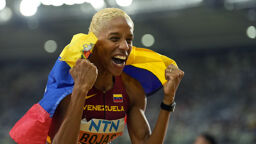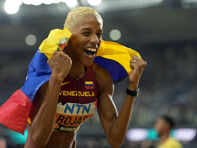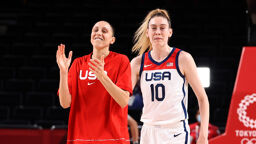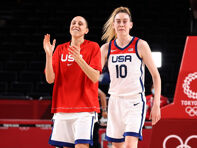Story from March 31, 2008
A few months ago, a story was published in my local newspaper, the Santa Cruz Sentinel, about me, a University of California, Santa Cruz, athlete who had come out to his team and was able to overcome homophobic taunts with the support of his teammates.The article, reprinted on Outsports, painted a picturesque coming out tale that all of the local Santa Cruzans could swallow with their morning coffee.
All of the responses my family and I got from friends and members of the community were overwhelmingly positive. While the article makes it sound like I confidently strode into the athletic department like a fearless warrior to declare my sexual orientation, it was actually a much more nerve-racking, drawn-out process.
Brice Dahlmeier
I knew I was gay probably when I was in the sixth grade. To some people’s amazement, I did actually know what it meant to be gay. I also understood from other kids using ‘gay’ as an insult, that it was a bad thing. Throughout junior high and high school in Northern California I did my best to project a masculine demeanor, going as far as having a girl friend in high school for six months — talk about awkward. Even though I wasn’t exactly happy with how I was living my life, I wasn’t about to become the first openly gay guy at my high school. I tried to just ignore this fact about my life by focusing on getting good grades, enjoying my nonsexual relationships and volleyball.
Photo courtesy of Wyatt Hull photography
Volleyball is traditionally perceived as a women’s sport (just look at how many collegiate women’s volleyball teams there are compared to men’s teams) and my club team did not hesitate to embrace the more feminine aspects of the sport.
While most of the teams we competed against were mainly concerned with winning, my club — Bear Volleyball — was mainly concerned with having fun at all costs. Our typical pregame warm up would consist of blasting some obnoxious song (something by Aqua wasn’t uncommon) on our boombox and dancing. Furthermore, we decorated our shoes using multicolored Sharpies; one of my teammates wore different colored headbands with his long curly mullet. We quickly became well known in the NorCal tournaments for our eccentric style — and we were pretty good too. I couldn’t help but feel like other players — probably some of who were gay — were jealous that our team was so oblivious to the concept of hegemonic masculinity. So, I was able to act “gay” at times and not have to be scrutinized or criticized as actually being homosexual; as far as they knew I was just playing along.
Overall, my high school experience wasn’t so bad. I ended up following my coach to UC-Santa Cruz, hoping to find a similar environment where I could be myself. I remember my first exposure to the college world.
Before school started the UCSC men’s volleyball team had to show up for the girl’s games to help out with stats. I was introduced to one of the starters and we talked while watching the game. In about five minutes the question came up, “So how many times you been laid?” I had never been confronted so abruptly about my sexual life. My stomach jumped up into my mouth and I shamefully held up my hand in the shape of a zero. “What?” he exclaimed in disbelief. “Are you gay?” Bah! I scoffed. What an absurd idea I thought to myself. Meanwhile, it was as if my body knew the truth as my organs wrenched in discomfort. And so I was introduced to the more common arena of sports. I later found out that many of my teammates had gay friends, but then again they didn’t have to share a locker room or a bed with these gay friends. Quite simply, I was terrified of these guys.
My freshman year I was one of four guys on my dorm floor, living with about 18 women. It was a straight guy’s dream. While I had successfully avoided almost all possible sexual situations with women in high school, it was becoming increasingly difficult. These girls were crafty, and a few times I found myself suddenly alone with one of them in their rooms. I thought at those moments, “this is an opportunity to prove to yourself that you are in fact straight.” Considering, I was, in fact, very much not heterosexual, these situations just ended up being incredibly awkward. A combination of these sexual failures and an overwhelming feeling that I was going to one day find myself an old man with a wife and kids, led me to finally say to myself, “I’m gay.”
Telling my friends
It wasn’t until February of my sophomore year that I finally came out to Gaby, one of my closest friends and housemate. She was blown away. Like most of my female friends, she just figured I was asexual. She explained, “I finally know how to act around you … I could never quite figure out where you were coming from.”
I wanted to come out to the rest of my housemates but wanted to avoid the super intense serious talk that started: “Guys, I have something I want to tell you …” My friend suggested that I make it a game. And so my next two housemates found out via Hangman. They had gotten down to “B-R-I-C-EI-S G-A _.” My housemate was just about to pee her pants while they were guessing, “Brice is gax! … No, Brice is gat? … hmm.” Meanwhile I was about to have a heart attack. Finally, Gaby says “It’s a synonym for happy.” Perhaps out of fear that I would be thoroughly insulted, my other housemate cautiously whispered, “Brice is Gay?” Meanwhile, Maggie, my other housemate, was thoroughly confused. Only after several declarations, of “Yes, I am actually gay. No really! I’m gay” did they understand what was going on.
For my next friend, we set up a scavenger hunt in which the final clue was me saying, “It’s in my vagina!!!” (referencing an Oprah skit on MadTV that we had watched earlier). She searched my pants and found a note that read, “You win! Oh, and by the way, I’m gay.” After my next friend got upset when I told him using charades, I decided that this probably wasn’t the best method after all.
Telling my family
Next on the list was my family. My family is pretty liberal so I wasn’t expecting to be disowned or anything, but it was still really difficult to bring up this issue that we had never before discussed. I first told my brother. We were going out to dinner and I had texted him that I wanted to talk to him about something. Even though I’m really close to my brother and knew that he wouldn’t give a rat’s ass, I was literally shaking when I said, “Well uh, I’m actually gay.” Grinning and slapping his knee, he exclaimed, “I knew it!” I just about melted into the seat as the apprehension left my body.
He then proceeded to tell me how we must have some psychic connection because he knew that I was going to tell him this precise bit of information when he read my text. Over dinner we brainstormed ideas of how to come out to my parents. My favorite was to jump out of my dad’s birthday cake in a rainbow colored Speedo … “Surpriiiiise!” After I came out to my mom — apparently she had known for years — I shared this idea with her and she told me, “Brice I love you, but if you kill my husband in shock, I will never forgive you.” I agreed.
Up to this point in my life, I didn’t know my dad very well. I was sure he would be accepting, but I had never opened up to him about anything. It wasn’t until the traumatic episode of my other male housemate turning suicidal and blaming my other housemates and I for abandoning him that he said, “Brice, I know I’m not very good at this type of thing, but if you ever want to talk about what happened with [crazy housemate] I’m here.” I eventually was able to tell my dad I was gay over a dish of gelato. He responded, “Well, thanks for telling me.” I tried to mirror his nonchalant outward appearance, but my insides were exploding with all kinds of interesting feelings (I’m sure most gay people know this feeling).
Telling my team
Before the school year ended I called my coach of five years and told him that I was gay. He was totally supportive and was glad that I trusted him so much. I tried to communicate why the season was so hard for me and why it was difficult being in the closet around the team, but I had a hard time even convincing myself of what made it hard.
Dahlmeier’s UCSC team is ranked No. 1 in Division III.
At the end of the conversation, my coach told me that he fully supported me whether I decided to come out to the team or not. Throughout the summer I came out successfully to some high school friends, but the seemingly insurmountable task of telling my team loomed. I probably spent several hours a day thinking of different ways to tell them, who I would tell first and how each teammate would react. 
Photo courtesy of Wyatt Hull photography.
That summer I participated in a study about gay athletes and body image, and Shaun, the interviewer, turned me on to this book, “In the Game,” by Eric Anderson. That book illuminated many aspects of masculinity on sports teams that I had never thought of, and was really helpful in boosting my confidence in my coming out strategy.
The first time I saw the team that year was at a recreation center festival. Out of the blue one my teammates asked, “Hey Brice, when was the last time you got laid?” Trying to think of an ambiguous, yet dismissive answer I smiled and said, “A long time.” Then another teammate said, “You know we’re talking about chicks right?” While the group of guys laughed, I felt crawling under the table. I was not to be discouraged though; coach and I agreed that it would be best to tell a few of the upperclassmen who knew me best, before the season started.
After one of the preseason open gyms he asked three guys to stay after practice. I was so nervous I just said, “Let’s meet tomorrow night in coach’s office, there’s something I want to talk to you guys about.” The next day all I could think about was the meeting that night. I tried to convince myself that it was out of my control; I would just say what I had to and let them react however they wanted to. I walked into the room where they were all sitting on the couch.
My coach said, “Do you want me to say anything?” I said, “No. Guys, I trust you as friends and as teammates and it’s hard for me to keep this from you all … so I just wanted you guys to know that I’m gay.” I barely got out that last word before I ran out of breath. I think one guy’s mouth fell open, and the captain’s eyes rolled back into his head (at least that’s how I remember it), and then they just said, “OK.” One of them said, “I thought you were going to tell us you were quitting.” This time my insides exploded with pride … I had done it! The captain then asked me if it was bothersome that some guys used ‘gay’ or ‘fag’ as slang. And before I answered, my coach said, “I want it to stop. A few years ago, that language was used a lot as an insult or to motivate each other and I think it tore our team apart.” I wanted to hug my coach, or … ahem, bump chests, real manly-like.
Immediately I felt more comfortable around my teammates, considering I no longer felt the need to assert my “straightness.” I still had this constant feeling of apprehension, because I didn’t know who knew about me on my team. It wasn’t until the article in the local paper was about to be published that my coach and I sat down with the whole team — this was about three months after my initial coming out to a few of the upperclassmen. My coach gave a little talk and then I told the team that I wasn’t trying to be a celebrity or anything — this broke the tension — and that I felt that this little bit of visibility for gay athletes was important. I know I would’ve been thrilled to see an article like that when I was in high school. After this, I felt like a new person. The article came out and I was surprised to hear from some of my friends. I wrongfully assumed they would not want to ever talk to me again.
Some of the best surprises were from my teammates. Even though I still hear the occasional, “what a fag” or “that’s gay” type of language, I appreciate the effort they make to watch what they say around me.
After a road trip, when we were all drinking together, my teammate confronted me: “Brice, I have an honest question. Does it offend you when we say gay or fag? I mean none of us have anything against gay people, were not homophobic, but it’s just like a habit. You know, when we say it, we mean stupid or like ‘that sucks.’ ” I was thrilled that my teammate had the courage to ask this potentially uncomfortable question, and I was glad that I had been thinking about this a lot so I could answer him. I told him that I understood that they did not mean it to be malicious towards gay people, but it was offensive to me. Obviously the two aforementioned definitions didn’t come about by coincidence. At one point the word gay became a derogatory term used to describe effeminate men.
My teammate still found it hard to understand why a word that simply meant “stupid” could be offensive to me. His curiosity was genuine so I tried a different approach. I told him that surely he is familiar with the insult of “Oh, you’re gay” or “you’re a fag.” He agreed. I then said that the word gay or fag, used in this context — which was always the case when I heard athletes use it — never had any positive connotations. The term was always used to imply inferiority and whenever I heard ‘gay’ or ‘fag’ it was a reminder that I was a part of this minority group that was equated with weakness in so many peoples’ minds.
It is one thing for me, an openly gay athlete, to know the true meaning of my teammates’ words, but imagine what it is like for an athlete who is struggling with his own sexuality to hear these kinds of remarks. Besides, there are so many other original and more effective insults. I swear, some of the hecklers at our games are so pathetic. Not that I’m a proponent of senseless insults, but they could at least show some bit of cleverness or sense of humor. Anyway, my teammate asked about my coming out experience and he seemed to understand that it was more of a struggle than he previously understood.
So now, coming to the end of my Spring Break, my team is ranked No. 1 in the nation in Division III, and we have the Final Four tournament in two weeks. I’d have to say nothing would be better to finish off this season with a national championship.
Even though I feel I must maintain a certain level of masculinity to hold my teammates respect and there are the occasional conversations about the ladies where I just kind of exclude myself, I hold a great amount of respect for my teammates for their open-mindedness. It gives me hope that the traditionally masculine arena of sports has the capacity to be more progressive.
With so many people who relate to sports — either through participation or just fanatical appreciation — it is a really exciting and important space to have these changing attitudes toward homosexuality. I just hope these changes make their way up to the professional level as my generation of athletes progress.
Brice Paul Dahlmeier, 20, is in his third year at the University of California, Santa Cruz. He is transferring to UC-Berkeley this fall. He is in a program called the 3/2 dual degree program where he will earn a B.A. in Environmental studies from UCSC and a B.S. in Civil Engineering from Berkeley. After college, he says he wants to “go to Europe and put off getting a real job as long as possible.” He can be reached via e-mail.







































